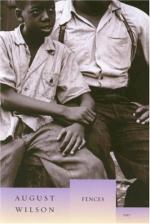|
This section contains 6,840 words (approx. 23 pages at 300 words per page) |

|
SOURCE: "The Good Christian's Come and Gone: The Shifting Role of Christianity in August Wilson Plays," in MELUS, Vol. 16, No. 3, Fall, 1989–1990, pp. 127-42.
In the following essay, Shannon examines Wilson's treatment of Christianity in his plays.
The center of African American playwright August Wilson's growing theatrical universe is conspicuously occupied by African American men. They are the thinkers, the doers, the dreamers. Revolving around them in seemingly expendable supporting roles are wives, mistresses, sisters, children and other relatives. As characters such as Levee (Ma Rainey's Black Bottom), Troy Maxson (Fences), Herald Loomis (Joe Turner's Come and Gone), and Boy Willie (The Piano Lesson), impose their authority, they overshadow the concerns of others. Most noticeable in their blind quest for omnipotence and wealth is that they place no stock in Christian dogma, adapting instead a purely secular ideology. Consequently, what emerges from their abandonment of Christianity is a more...
|
This section contains 6,840 words (approx. 23 pages at 300 words per page) |

|


